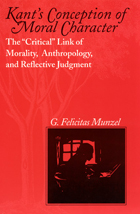5 start with K start with K

The first book to focus on character formation in Kant's moral philosophy, it builds on important recent work on Kant's aesthetics and anthropology, and brings these to bear on moral issues. Munzel traces Kant's multifaceted definition of character through the broad range of his writings, and then explores the structure of character, its actual exercise in the world, and its cultivation.
An outstanding work of original textual analysis and interpretation, Kant's Conception of Moral Character is a major contribution to Kant studies and moral philosophy in general.

The human rights regime is one of modernity's great civilizing triumphs. From the formal promulgation of the Universal Declaration of Human Rights in 1948 to the subsequent embrace of this declaration by the newly independent states of Africa, human rights have emerged as the primary discourse of global politics and as an increasingly prominent category in the international and domestic legal system. But throughout their history, human rights have endured sustained attempts at disenfranchisement.
In this provocative study, Linda Hogan defends human rights language while simultaneously reenvisioning its future. Avoiding problematic claims about shared universal values, Hogan draws on the constructivist strand of political philosophy to argue for a three-pronged conception of human rights: as requirements for human flourishing, as necessary standards of human community, and as the basis for emancipatory politics. In the process, she shows that it is theoretically possible and politically necessary for theologians to keep faith with human rights. Indeed, the Christian tradition—the wellspring of many of the ethical commitments considered central to human rights—must embrace its vital role in the project.

If most Americans accept the notion that the market is the most efficient means to distribute resources, why should body parts be excluded?
Each year thousands of people die waiting for organ transplants. Many of these deaths could have been prevented were it not for the almost universal moral hand-wringing over the concept of selling human organs. Kidney for Sale by Owner, now with a new preface, boldly deconstructs the roadblocks that are standing in the way of restoring health to thousands of people. Author and bioethicist Mark Cherry reasserts the case that health care could be improved and lives saved by introducing a regulated transplant organs market rather than by well-meant, but misguided, prohibitions.

Writing and violence have been inextricably linked in Spanish America from the Conquest onward. Spanish authorities used written edicts, laws, permits, regulations, logbooks, and account books to control indigenous peoples whose cultures were predominantly oral, giving rise to a mingled awe and mistrust of the power of the written word that persists in Spanish American culture to the present day.
In this masterful study, Aníbal González traces and describes how Spanish American writers have reflected ethically in their works about writing's relation to violence and about their own relation to writing. Using an approach that owes much to the recent "turn to ethics" in deconstruction and to the works of Jacques Derrida and Emmanuel Levinas, he examines selected short stories and novels by major Spanish American authors from the late nineteenth through the twentieth centuries: Manuel Gutiérrez Nájera, Manuel Zeno Gandía, Teresa de la Parra, Jorge Luis Borges, Alejo Carpentier, Gabriel García Márquez, and Julio Cortázar. He shows how these authors frequently display an attitude he calls "graphophobia," an intense awareness of the potential dangers of the written word.

The failure of current immigration policies in the United States has resulted in dire consequences: a significant increase in border deaths, a proliferation of smuggling networks, prolonged family separation, inhumane raids, a patchwork of local ordinances criminalizing activities of immigrants and those who harbor them, and the creation of an underclass—none of which are appropriate or just outcomes for those holding Christian commitments.
Kinship Across Borders analyzes contemporary US immigration in the context of fundamental Christian beliefs about the human person, sin, family life, and global solidarity. Kristin Heyer expertly demonstrates how current US immigration policies reflect harmful neoliberal economic priorities, and why immigration cannot be reduced to security or legal issues alone. Rather, she explains that immigration involves a broad array of economic issues, trade policies, concerns of cultural tolerance and criminal justice, and, at root, an understanding of the human person.
In Kinship Across Borders, Heyer has developed a Christian immigration ethic—grounded in scriptural, anthropological, and social teachings and rooted in the experiences of undocumented migrants—that calls society to promote concrete practices and policies reflecting justice and solidarity.
READERS
Browse our collection.
PUBLISHERS
See BiblioVault's publisher services.
STUDENT SERVICES
Files for college accessibility offices.
UChicago Accessibility Resources
home | accessibility | search | about | contact us
BiblioVault ® 2001 - 2024
The University of Chicago Press









